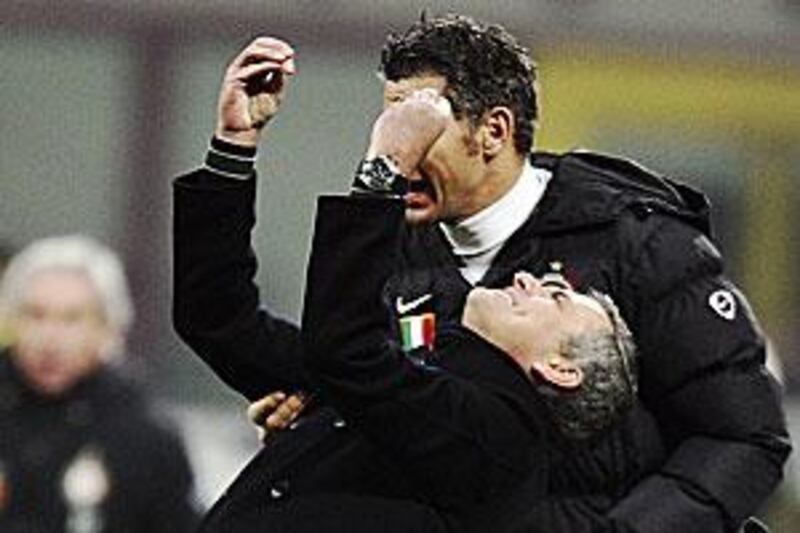Inter Milan are a team in their manager's image, beamed one newspaper columnist yesterday. The writer, interestingly, was Portuguese. In Portugal, reflected pride in the achievements of Jose Mourinho as a head coach abroad never diminishes. In Italy, he is viewed close up with rather abated enthusiasm.
Inter may well be a team built in Mourinho's image but that image is quite often the one that was glimpsed close to the end of Sunday night's 2-0 victory over AC Milan, the image of a man close to the end of his tether, being hauled back towards his seat on the bench by his assistant Beppe Baresi before he got himself into deep trouble. Inter were two goals in the lead at the time, nine points clear at the top of the Serie A table, and the derby had entered the second minute of the period added on for stoppages. Julio Cesar, the Inter goalkeeper, had just pawed away a penalty from Ronaldinho. Mourinho was evidently excited by the fact that Milan's last plausible chance to find a way back into the contest had been snuffed out, but he was also furious at the dismissal of Lucio for the handball that led to the spot-kick.
It was Inter's second red card of the evening and Mourinho had been highly-strung ever since Wesley Sneijder's sending-off in the first half. Two men off? If Inter were a team in their head coach's image, that would make them agitated, angry and rather paranoid. After the win came the conspiracy theories. "I can see what's going on here," spat Mourinho. "The match officials are doing everything they can to stop us winning. I have seen clearly for some time they won't let us get a secure hold on the scudetto."
This sort of rhetoric has been a consistent thread in Mourinho's career, ever since was a club coach in Portugal, where the bias of referees could indeed be bought occasionally during the era when Mourinho worked at Porto. Italy has its own recent scandal involving the partiality of match officials - the 2006 calciopoli affair - but Mourinho's idea that referees gang up against his teams seem based as much on his habit of creating a siege mentality as a genuine suspicion of covert skulduggery. And those habits can become contagious.
The Inter president Massimo Moratti could be heard on Sunday night echoing Mourinho's complaints. "The breeze is set against us," muttered Moratti darkly. "I can see more and more clearly unpleasant signs of that. The referee played a big part in the game against Milan, and it was not right that we played most of it with 10 men." Inter played for the best part of an hour against Milan without Sneijder precisely because the Dutchman also seemed to have bought into Mourinho's intensified campaign that says the authorities are set against Inter taking a fifth successive league title. Sneijder's offence was showing a lack of respect to the referee, Gianluca Rocchi, specifically for applauding Rocchi sarcastically for showing a yellow card to Lucio.
Sneijder clapped ostentatiously and by no means briefly right in front of Rocchi, and for that, and perhaps for some verbal abuse, he was shown the red card. Rather than chastise his player for an immature and damaging lack of discipline, Mourinho went on the attack. "The referee asked me whether I would be cross if one of my players sarcastically applauded one of my decisions," reported Mourinho. "I said 'no, I'd let it go'."
This may be the case, although it is hard to believe. Most players who have worked with Mourinho would be sceptical about his being tolerant of anybody mocking his judgement. He is not a boss who appreciates indolence. "The referee ought to have shown more common sense with Sneijder," continued Mourinho, before resuming his favourite theme. "We then began to see over time that it was not a coincidence that Mr Rocchi gave Sneijder that red card."
So it was an agitated Mourinho was obliged to watch an agitated Inter play a defensive game for the final 68 minutes of the derby. For the third time in three weekends, they had put themselves in difficulties. For the third time in succession, they emerged intact. A fortnight earlier, they had been 3-2 down against Siena and won. Last weekend, they fell 2-0 down to Bari and scraped back a point.
There is much to admire in this sort of resilience, but for a coach who likes to exert so much control, these disordered starts are infuriating, and, it might be suggested, far less embarrassing for the manager if they can be blamed on the referee. Naturally, Mourinho wanted to claim credit for Sunday's victory, even if he admitted that Goran Pandev's goal - Diego Milito had scored the first, early on - was something of a bonus. The head coach had been preparing to substitute the striker just before he curled in an excellent free-kick in the 65th minute. "Sometimes," he chuckled, "it is better to be a lucky coach than a good one."
Of course, that does not mean Mourinho thinks he is not still a very special coach indeed. "We were fantastic tactically, physically and psychologically," he concluded. Fantastic psychologically? Mourinho and his Inter might benefit sometimes from a little tranquillity, and less agitation. @Email:ihawkey@thenational.ae






